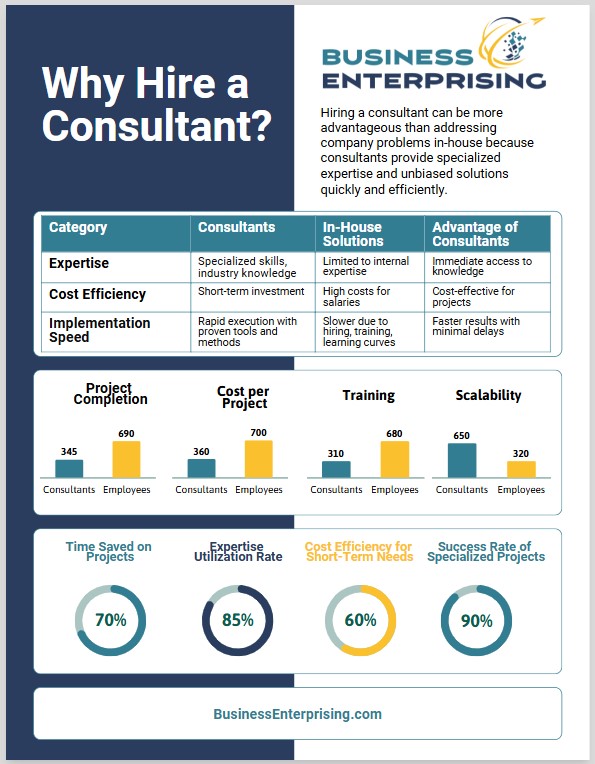 Choosing between consulting vs. inhouse solutions is an important decision for your business. Both approaches offer benefits depending on your needs. Consulting provides quick access to expertise and is ideal for short-term or specialized projects. In-house solutions, on the other hand, build internal knowledge and support long-term growth.
Choosing between consulting vs. inhouse solutions is an important decision for your business. Both approaches offer benefits depending on your needs. Consulting provides quick access to expertise and is ideal for short-term or specialized projects. In-house solutions, on the other hand, build internal knowledge and support long-term growth.
Each option affects how your business allocates resources and adapts to challenges. Consultants bring outside perspectives and tools, but in-house teams ensure continuity and control. Understanding the trade-offs between flexibility, cost, and scalability helps you determine the best fit for your goals.
This guide will explore the advantages and limitations of both consulting and in-house solutions. By examining key factors like cost, expertise, and sustainability, you can make an informed decision. Selecting the right approach sets your business up for success and continued growth.
Definition and Key Differences Between Consulting and InHouse Solutions
Consulting and inhouse solutions are two distinct approaches to addressing business needs. Consulting involves hiring external experts to provide specialized knowledge and insights. These professionals bring experience across industries and offer an objective perspective. In-house solutions, on the other hand, rely on your internal team to manage projects or solve challenges. This approach draws on resources and expertise already within your organization.
The primary difference between consulting and in-house solutions lies in resource allocation. Consulting allows you to access expertise without investing in long-term staff or infrastructure. In contrast, in-house solutions require building and maintaining a dedicated team, which can increase costs over time. However, in-house teams often provide more immediate control and alignment with your company’s culture and goals.
Scope and specialization also set these approaches apart. Consultants typically focus on specific projects, offering advanced tools and methods to achieve short-term objectives. In-house teams, however, can address ongoing needs and adapt their skills over time. While consultants bring external knowledge, in-house solutions create opportunities for knowledge retention within your organization.
When evaluating consulting vs. inhouse solutions, consider the complexity and timeline of your project. Consulting often delivers faster results for specialized tasks, while in-house teams excel at managing continuous operations. Understanding these key differences helps you choose the approach that best fits your business goals and resources.
Cost Comparison: Consulting vs. Inhouse Solutions
When comparing consulting vs. inhouse solutions, cost is often a deciding factor. Hiring consultants typically involves a higher upfront expense. Consultants charge based on expertise, scope, and duration, which can make short-term projects more costly. However, these costs are temporary and eliminate the need for long-term commitments like salaries or benefits.
Inhouse solutions, on the other hand, require ongoing financial investment. Building an internal team involves recruiting, training, and maintaining employees, which adds to operational costs. Additionally, you may need to invest in infrastructure, tools, and software to support your team. While these costs are spread over time, they can increase significantly with expansion or turnover.
Despite the higher initial expense, consulting can be more cost-effective for specialized or short-term needs. For example, consultants provide advanced expertise without requiring long-term financial commitments. In contrast, in-house solutions are more economical for ongoing projects or tasks that require consistent management. Over time, the ability to develop internal expertise may offset initial setup costs.
Ultimately, the financial implications of consulting vs. inhouse solutions depend on your business goals and project duration. Consulting offers flexibility and scalability, while in-house teams provide stability and control. By understanding these differences, you can align your choice with your budget and long-term strategy.
Scalability and Flexibility of Each Approach
Scalability and flexibility are important considerations when choosing between consulting vs. inhouse solutions. Consulting offers high flexibility, allowing you to scale resources quickly to meet project demands. If your business needs temporary expertise or short-term support, consultants can provide tailored solutions without requiring long-term commitments. This approach is ideal for projects with fluctuating workloads or unpredictable timelines.
In-house solutions, while less flexible initially, offer greater scalability over time. Building an internal team gives you the ability to develop specialized expertise within your organization. As your business grows, in-house teams can expand alongside your operations. However, scaling in-house solutions often involves hiring, training, and investing in infrastructure, which can take time and resources.
Consultants adapt easily to changing business needs because they bring specialized skills for specific tasks or industries. This adaptability makes them valuable for addressing sudden challenges or implementing rapid changes. In contrast, in-house teams excel in maintaining consistency and long-term growth. Their familiarity with your processes and culture helps them adapt more seamlessly to gradual changes within your organization.
When evaluating consulting vs. inhouse solutions, consider how quickly your business may need to adjust to growth or market shifts. Consulting provides immediate flexibility, while in-house solutions offer scalability for sustained expansion. Balancing these factors will help you choose the approach that aligns with your business objectives.
Access to Expertise and Specialized Skills
Access to expertise and specialized skills is a key consideration when choosing between consulting vs. inhouse solutions. External consultants bring deep industry knowledge and experience, often gained from working with a variety of businesses. This broad perspective allows them to offer innovative ideas and proven strategies that may not be available in-house. For specialized or time-sensitive projects, consultants provide immediate access to advanced tools and techniques.
Building in-house capabilities, on the other hand, allows your team to develop long-term expertise that aligns closely with your company’s goals. In-house employees gain a deeper understanding of your processes, culture, and customer needs over time. This familiarity makes them well-suited for addressing ongoing challenges and implementing tailored solutions. However, developing these skills often requires significant time, training, and investment.
Consultants are especially beneficial when your business faces unique challenges or needs niche expertise. For instance, implementing new technologies or navigating regulatory changes may require skills your internal team lacks. While in-house teams provide consistency, consultants offer a faster and more cost-effective way to fill knowledge gaps. This makes consulting a valuable option for projects that demand immediate results.
When comparing consulting vs. inhouse solutions, think about your current expertise and future needs. Consulting delivers quick access to specialized skills, while in-house capabilities support sustained growth and deeper integration. Balancing these advantages will help you determine the right approach for your business.
Timeframes and Implementation Speed
When comparing consulting vs. inhouse solutions, timeframes and implementation speed are critical factors. Consulting projects often move faster due to the availability of specialized expertise. Consultants come prepared with established methodologies and tools, which can reduce the time needed for planning and execution. This makes consulting ideal for projects with tight deadlines or those requiring immediate results.
In-house development, while valuable for long-term goals, often takes more time to execute. Building internal teams requires hiring, training, and equipping staff, which can delay project start dates. Additionally, in-house teams may need to learn new skills or adapt to unfamiliar challenges, further extending timelines. However, once established, in-house teams can sustain projects over time without relying on external assistance.
Consultants can also accelerate execution by providing fresh perspectives and addressing problems efficiently. Their ability to focus exclusively on a project ensures rapid progress. In contrast, in-house teams often juggle multiple responsibilities, which can slow project completion. However, in-house solutions offer the advantage of consistency and deeper integration into your business operations over time.
The speed of execution depends on the complexity and urgency of your project. Consulting offers quick results for short-term needs, while in-house solutions build capacity for ongoing development. Understanding these differences helps you choose the best approach for achieving your business goals efficiently.
Long-Term Impact on Organizational Knowledge and Sustainability
The long-term impact on organizational knowledge is a key consideration when evaluating consulting vs. inhouse solutions. Consulting provides immediate access to expertise but often leaves less knowledge behind once the project ends. Consultants focus on delivering solutions, which can limit your team’s involvement in the process. As a result, your business may rely on external support for similar challenges in the future.
In-house solutions, by contrast, help you build and retain expertise within your organization. Employees gain firsthand experience working on projects, which enhances their skills over time. This internal growth fosters independence, reducing the need for outside assistance. Additionally, retaining knowledge internally allows your team to respond more effectively to future needs or opportunities.
Sustainability is another important factor to consider. While consulting can address short-term goals, in-house teams are better suited for ongoing challenges. Internal staff develop a deeper understanding of your processes and culture, which contributes to long-term success. However, building in-house capabilities requires significant time and investment, making it a gradual approach to knowledge retention.
Both approaches have value, depending on your business goals. Consulting offers rapid results but may limit long-term independence. In-house solutions prioritize sustainability by embedding expertise within your team. Balancing these factors will help you create a strategy that supports your organization’s growth and resilience over time.
Conclusion
Deciding between consulting vs. inhouse solutions depends on your business goals, resources, and priorities. Each approach offers unique advantages that address different needs. Consulting provides quick access to specialized skills and faster execution for short-term projects. In contrast, in-house solutions help you build long-term knowledge and maintain independence over time.
Both options can be effective, but their impacts vary based on your company’s structure and future plans. Consulting is flexible and adaptable, while in-house teams grow alongside your organization. By carefully weighing these factors, you can align your choice with your objectives and operational needs.
Ultimately, the right approach depends on finding the balance that supports your goals. Whether you prioritize immediate expertise or sustainable growth, understanding these differences helps you make informed decisions. Evaluating consulting vs. inhouse solutions allows you to choose the best path for your business’s success.



